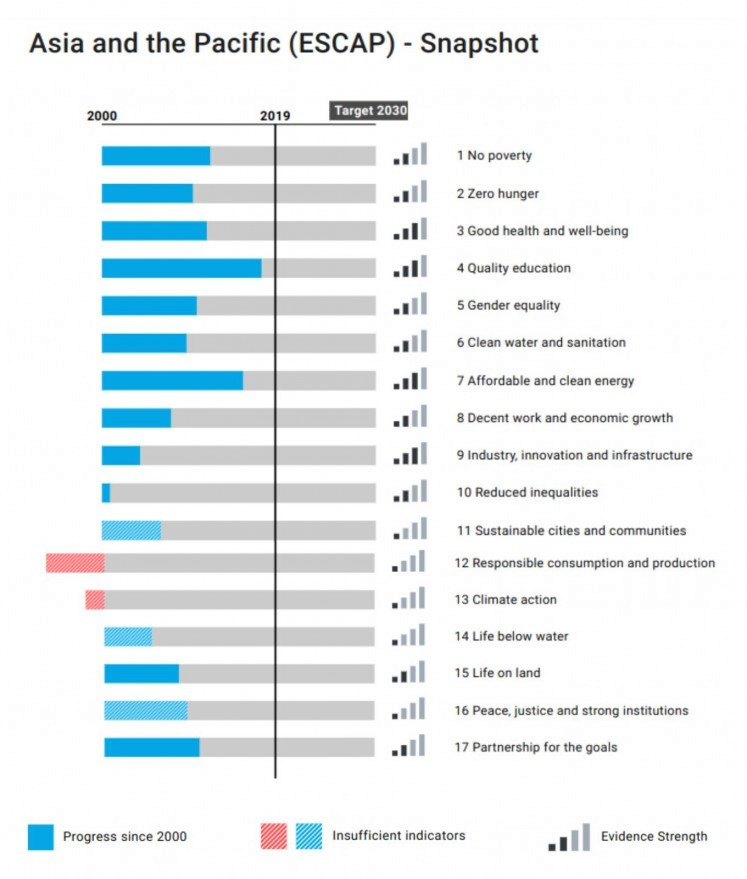Popular Reads
Top Results
Can't find what you're looking for?
View all search resultsPopular Reads
Top Results
Can't find what you're looking for?
View all search resultsChampioning grassroots solutions: A breakthrough for SDGs
Such nuanced and yet complex understanding can help narrowing the gap between decision-makers and communities to increase the impact of our SDGs works.
Change text size
Gift Premium Articles
to Anyone
I
f you take a close look at the rich fabric of Indonesia’s communities, you will find that grassroots innovation is thriving – so much so, that it could provide solutions to some of the world’s most complex challenges.
For example, farmers in Bali are breeding plastic-eating insects to reduce waste, while a group of women in the Papua region have united to protect the biodiversity of the pristine waters of Raja Ampat. These are just two examples of the myriad community solutions in place all over this incredibly diverse country.
Many of these initiatives hold the power to accelerate efforts to achieve Indonesia’s Sustainable Development Goals (SDGs), which brings us to the question: Why are we not empowering more grassroots initiatives to create a larger impact?
The missing link may rest on a set of new methodologies which UNDP Indonesia aims to bring to the table; sense-making, solutions mapping and experimentation. This new thinking may sound like pseudo-scientific jargon, but they sum up an important message; a holistic, all-around approach which puts local communities at the center of the solution. It’s about building a more coherent picture of development challenges by tapping into a more collective insights.
The new thinking is at the core of UNDP Indonesia’s newly established learning hub, the Indonesian Accelerator Lab which we launched this week. With funding from our core partners, the Federal Republic of Germany and Qatar Fund for Development, the Indonesian Accelerator Lab stands among 91 Labs in 115 countries that seek and scale up solutions for SDGs acceleration.
Our accelerator lab works towards developing innovative solutions which will put grassroots communities as “agents of change”. As part of a global network, the Lab will also collectively build knowledge, and employ data in addressing today’s fluid and increasingly complex development challenges.
The Indonesian Accelerator Lab has done some preliminary studies and data-collection activities, which confirm initial observation regarding the missing link in the development process. For example, during the Lab’s ethnographic study on flood-hit communities in Jakarta, we found that there was a disconnect in empowering the affected communities.
Some urban resettlement programs did not factor in the importance of social identity and cohesion for communities who had developed strong attachment to their surroundings. As a result, many of the flood-hit communities keep coming back to their homes despite the recurrent floods. Hence, understanding that there is no “one size fits all” is crucial, as it could give more room for communities to inject local solutions to their problems.
The lab also provides an opportunity to ensure gender-inclusive development. Working with the community, we can ensure women’s voices in the narrative and use their innovative ideas towards developing solutions to the issues that affect them most. For example, during our first quick public survey on major urban communities in Indonesia, we found that some community members cited social stigma and limited understanding of sexual and reproductive health and rights as part of the growing issues on the ground. This is something which policymakers should pay more attention to when designing urban development strategies.
It is hoped that findings from UNDP Indonesia’s accelerator lab can add value and most importantly contextualize much-needed perspective from the underserved communities which may have been missing in previous development processes. Such nuanced, yet complex understanding can help narrowing the gap between decision-makers and communities to increase the impact of our work towards achieving the SDGs.
Nonetheless, we are mindful that systemic change cannot happen overnight. This is where lean activities such as sense-making, exploring, and experimenting in short cycles comes handy. Such approaches will allow the Indonesian Accelerator Lab to test things quickly and learn best practices through trial and error. For that to happen, partnerships are also a key factor.
In addition to supporting local governments and working together with other stakeholders, the Indonesian Accelerator Lab plans to work with the Ministry for Research and Technology, universities, technology companies, innovation associations, community leaders, businesses, civil society organizations, and other like-minded groups.
With only nine years to meet the 2030 Agenda for Sustainable Development, embracing new approaches on development solutions has become more crucial than ever. The level of urgency has also been heightened after a year of the COVID-19 pandemic which is expected to cause severe setbacks to our development gains in the long term. In fact, according to last year’s joint study by UNDP and the University of Denver, more than 250 million people worldwide could be pushed into extreme poverty by 2030 under a “high damage” scenario.
But our grassroots communities are resilient, and the richness of opportunities abound for all of us.
Back to the wisdom of grassroots solutions in Indonesia, communities in Glintung village of East Java have transformed their once flood-prone areas into an eco-friendly and flood-free village, thanks to their own efforts in installing biopore infiltration holes to absorb excess waters.
There might be a long road ahead to adopt the practice into a larger scale elsewhere, but by taking the first of step of adopting collective action, and putting the community of at the forefront, positive change elsewhere is bound to happen.
***
The writer is UNDP Indonesia resident representative.










